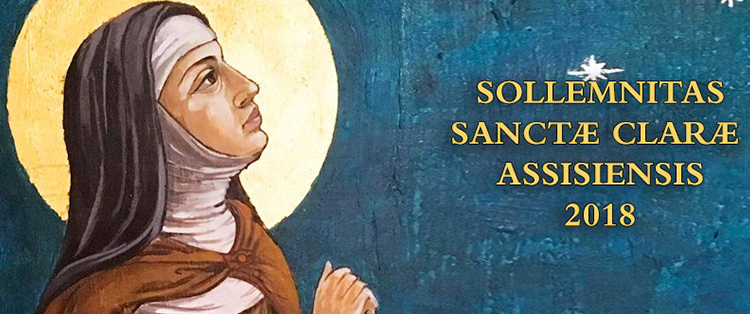

Discernment: purification of the gaze, of the heart, and of the will
Dearest sisters,
May the Lord give us his Peace!
Last year I offered you some reflections based on the words that guided our preparation as Friars Minor for the Plenary Council that we celebrated last June in Nairobi: listening, discerning, acting.
This year I would like to focus on the second element in particular. Looking at the example and words of Clare I would like to highlight some useful aspects that can help us towards a discernment that might increasingly shape our lives, making them a faithful and joyful response to God’s call in this time, and in this space that is given to each of us.
We have been adopted by God as children in the Son Jesus, who died and rose again, and so from the moment of our baptism we pray: “Our Father, thy will be done”. The way of discernment is the only possible authentic way of existing, because, as Francis tells us, “Nowthat we have left the world, however, we have nothing else to do but to follow the will of the Lord and to please Him.” (RnbXXII, 9). Clare on her part “insofar as she could, tried to please God.” (Proc8,3).
Looking back over the Clarian sources, the letters in particular, I notice that Clare lives and suggests discernment as a path of purification: purification of the gaze, of the heart, and of the will.
Purification of the gaze
The starting point is the reality in which we find ourselves; even before that, it is the reality that “we are,” that each of us “is” by nature and by grace. Very often we experience the distortion of reality within us and around us. Preconceptions and prejudices of any kind can distort our reading of what is going on within us or in our community, in the Church, or in society … Is this not an initial factor in many misunderstandings, misconceptions, or conflicting relationships?
Purify the gaze to ‘see’ well: to see how God sees us, to see without distorting filters. Just as she wrote to Agnes of Prague, Clare reminds each one of us today that by being like Jesus, making his gaze our own, we can ‘see’ reality in truth, beyond the changes produced by sin in all its forms: “He is the radiance of eternal glory is the brightness of eternal light and the mirror without blemish. Gaze upon that mirror each day, O Queen and Spouse of Jesus Christ, and continually study your face in it,” (4LAg14-15); for surely “in your light we see light” (Ps36 (35:10).
Clare had begun to experience the purification of the gaze when Francis “encouraged her to despise the world, showing her by his living speech how dry the hope of the world was and how deceptive its beauty. He whispered in her ears of a sweet espousal with Christ,” (LegsC5). Clare really learned this well as she writes to Agnes in Prague: “after all who ensnare their blind lovers in a deceitful and turbulent world have been completely passed over, may you totally love Him Who gave Himself totally for your love.” There is a fundamental, ‘original’ deception, whereby the ‘world’, seen as a vision of reality in opposition to God’s, appears attractive but is in fact deadly, seems to give happiness but instead enslaves and robs joy and vibrancy. In the third letter to Agnes, Clare uses very strong expressions in this regard: “so you, too, by following in her footprints, especially [those] of humility and poverty, can, without any doubt, always carry Him spiritually in your chaste and virginal body, holding Him by Whom you and all things are held together possessing that which, in comparison with the other transitory possessions of this world you will possess more securely. In this, certain worldly kings and queens are deceived, for, even though their pride may reach the skies and their heads touch the clouds, in the end they are as forgotten as a dung-heap!” (3LAg25-28). Communion with the Lord Jesus lived in the gift of self guarantees protection from the risk of spiritual ‘blindness’. Francis teaches us that only the purified gaze can see God in all things. Clare wants to form this same gaze in her sisters: “when the most holy mother used to send the serving sisters outside the monastery, she reminded them to praise God when they saw beautiful trees, flowers, and bushes; and, likewise, always to praise Him for and in all things when they saw all peoples and creatures.” (Proc14.9). Seeing reality as God sees it is the first step in recognising the traces of the paths of the Kingdom.
Purification of the heart
If a pure gaze reads reality in the truth of God, it is the heart that judges it, evaluates it, interprets it. Discernment as ‘judgment’ is the next step in which reality is confronted with the values that support and guide our journey of life.
According to the testimony of Bona di Guelfuccio, Francis urges the young Clare to take care of her heart by tuning it to the heart of Jesus: “He always preached to her that she might convert to Jesus Christ”. Conversion, like breathing, is the essential measure for Christians to continue living. Through experience Clare knows how easily the heart hardens, gets distracted, gets confused; that is why she rejoices in seeing Agnes of Prague: “you have brought to ruin the subtleties of our crafty enemy, the pride that destroys human nature, and the vanity that infatuates human hearts”. Pride and vanity prevent a correct judgment of reality, because they close one in on oneself, rather than opening to God or to others. On the contrary, as Pope Francis recently recalled, “it is proper to the Holy Spirit to decentralize ourselves from ourselves and open ourselves to the “us” of the community: to receive and to give. We are not at the centre: we are an instrument of that gift for others” (General Audience, 6 June 2018).
The heart is protected if it is entrusted to the Lord, in a daily movement of giving: “Place your mind before the mirror of eternity! Place your soul in the brilliance of glory! Place your heart in the figure of the divine substance and, through contemplation, transform your entire being into the image of the Godhead Itself, so that you too may feel what friends feel in tasting the hidden sweetness that, from the beginning, God Himself has reserved for His lovers.” (3LAg12-14).
Genuine discernment requires a refining of the taste for the things of God, being able to recognize the scent and taste of the Gospel in the events of life, in the people we meet, in the sisters we live with, as well as in those who live elsewhere. This exercise of contemplation is entrusted to you, sisters, in a very particular form and intensity, by which judgment matures and becomes the virtue of discernment. Clare is a true teacher of discernment: real situations in dialogue with professed values, without mystifying indulgence or compromises of convenience. “But our flesh is not bronze, nor is our strength that of stone, rather, we are frail and inclined to every bodily weakness! I beg you, therefore, dearly beloved, to refrain wisely and prudently from an indiscreet and impossible austerity in the fasting that you have undertaken. And I beg you in the Lord to praise the Lord by your very life, to offer the Lord your reasonable service and your sacrifice always seasoned with salt.” (3LAg38-41).
Purification of the will
The process of discernment is directed towards feeling challenged by the word of God in order to live in obedience to Him; it is aimed at dwelling within history in an evangelical way, following the footsteps of Jesus so that the kingdom of God may grow in the world. Our projects are good if they are not ‘only ours’, if they blossom, like a root, from our willingness to collaborate with all our hearts in the work that God is already doing.
It is good to choose whatever keeps us united to the Lord, and to reject whatever separates us from Him. Clare is able to turn down the offer of Pope Gregory IX – to be released from the bond of highest poverty and to accept the possessions that he offered himself – and to declare with simplicity and truth: “Holy Father, I never wish to be freed from following Christ” (LegsC14). And she exhorts Agnes of Prague, in a similar situation, to embrace the poor Crucified One (Cf.2LAg17-18).
How precious and meaningful, therefore, is the indication that both Clare and Francis place as a seal on their respective “rules”, almost as a summary of the whole forma vitæ: “Let them direct their attention to what they should desire above all else: to have the Spirit of the Lord and His holy activity, to pray always to Him with a pure heart, and to have humility, patience in difficulty and infirmity, and to love those who persecute, blame, and accuse us, for the Lord says: Blessed are those who suffer persecution for the sake of justice, for theirs is the kingdom of heaven. But whoever perseveres to the end will be saved.” (RsCX, 9-13).
In the light of these words, the summary of an entire life, we recognize that what Pope Francis says in the Apostolic Exhortation Gaudete et Exsultatewas accomplished in Clare and by Clare: “Discernment […] is an authentic process of leaving ourselves behind in order to approach the mystery of God, who helps us to carry out the mission to which he has called us, for the good of our brothers and sisters.” (GE175).
I hope, my dear poor ladies, that you may have a joyful celebration of the solemnity of our beloved sister and mother, Saint Clare of Assisi. Greetings!
Rome, 2nd August 2018
Feast of the Pardon of Assisi
Fr. Michael A. Perry, OFM
Minister General and Servant
Cover: Saint Clare. Painting on wood by Miguel Angel Laguna Villalobos (Convento San Antonio, Avila, Spain).
Prot. 108387



Date |
Name of the Friars |
Events |
Year |
04 |
St.Francis of Assisi Robin Lakra Pratap Reddy Salibindla Arulsamy A. Thomas Joseph Bobby V.T. Johnny Anthony Athanasius Xaxa Leos Ekka |
Solemnity Birth Solemn Vows Solemn Vows Solemn Vows Solemn Vows Solemn Vows Solemn Vows Solemn Vows |
1974 1988 1988 1988 1988 1989 1991 1991 |
06 |
Salim Joseph Babu Jose Pamplany James N. Trevor D’ Souza Malom - Noatoli + George Muthaiah |
Solemn Vows Solemn Vows Solemn Vows Solemn Vows Arrival Home |
1991 1991 1991 1991 1995 2002 |
08 |
North Guwahati Salvador D’ Souza |
Arrival Ordination |
1999 2011 |
10 |
+ Gerald D’ Souza |
Home |
2013 |
14 |
+ Bosco Jayaraj Tony D’ Souza |
Home Ordination |
1970 1990 |
15 |
Joy Sebastian Prasad Rao K. |
Birth Birth |
1972 1990 |
19 |
Provincialate Marius Dahanga |
Blessing Birth |
1998 1992 |
21 |
+ Basil Devasagayam Arockiasamy P. Eliyas Reddy |
Home Birth Birth |
1965 1970 1995 |
26 |
Gerald Lobo |
Birth |
1951 |
27 |
+ Paschal Lobo Jose Palimattom Benjamin Jojo Anil Xalxo Thumma Ranjith Kumar Reddy |
Home Birth Birth Birth Birth |
1956 1967 1975 1979 1988 |
28 |
Teiborlang Wartde |
Birth |
1987 |
30 |
Austin Francis |
Birth |
1972 |
30 |
Punitha Anthoniar Illam - Madurai |
Blessing |
1994 |
31 |
Manish Ekka |
Birth |
1993 |